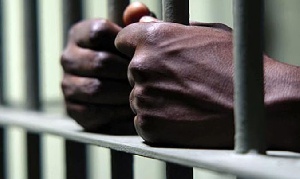 'Big men' endure the same deplorable conditions all other inmates face in prison
'Big men' endure the same deplorable conditions all other inmates face in prison
Law enforcement agencies when advocating for public law and order attempt to make us understand that all Ghanaians, irrespective of one’s social standing are equal before the law. As much as some Ghanaians trust these state agencies to enforce the above mantra, others doubt their ability to enforce the law to the letter.
Interestingly, in cases where ‘big men’, the rich and famous in our society, fall foul of the law and are jailed, a section of the citizenry have the opinion that they are given preferential treatment to make their stay behind bars, somewhat, comfortable.
There are perceptions related to their general welfare which includes feeding, bedding and healthcare. Others have reservations as regards duration of sentences imposed on them by courts as against actual periods they serve.
Overall welfare
‘Big men’ behind bars, like all prisoners, look up to the prison administration for all welfare needs. The Prisons Service is resourced by government to feed prisoners under its care. It should be stated here that, all prisoners, irrespective of their social standing, are fed with GH¢ 1.80 daily. As insufficient as the amount might look, that is what the service is making do with.
On the issue of bedding, the rich and famous do not enjoy any privileges from facility administrators as they are housed in same cells as other prisoners. Prisoner culture requires that newly admitted prisoners perform chores such as scrubbing and sweeping of cells. The rich and famous are mostly exempted from these chores by inmate cell leaders, mostly as a sign of respect and also because they enjoy some gifts when these class of prisoners receive visits.
A typical prison accommodation
The healthcare of all prisoners is the sole responsibility of the prison administration. Cases are first attended to by nurses and health staff of facilities and referrals are done whenever necessary. No prisoner is accorded preferential treatment as far as healthcare is concerned.
Do they exhaust their sentences?
Most Ghanaians have the belief that the rich and famous do not complete the full course of their sentences as some of them receive some form of presidential intervention, ranging from amnesties to pardons, before their terms are exhausted.
Presidential amnesties are enjoyed by only some categories of prisoners. They include first offenders who committed offences such as stealing, defrauding, assault and other misdemeanors and have served at least half of their sentences. In some cases, very old, terminally ill and nursing mothers are also considered. Death row and life sentenced prisoners who have served at least ten years qualify for recommendation to have their sentences commuted to life sentences and definite terms of twenty years respectively.
Prison authorities when informed by the Ministry of Interior, sets up Amnesty Boards which should include officials from the Bureau of National Investigations and the Criminal Investigations Department of the Ghana Police Service, across the country’s prisons to recommend deserving prisoners to the President. The President, mostly exercises this power during national holidays such as the Independence and Republic days.
Most presidential interventions for jailed ‘big men’ have come in the form of presidential pardons. The president has the power to pardon all categories of prisoners, no matter the offence committed. As far as the prison system is concerned, presidential pardons mostly result from petitions submitted to the president on behalf of the prisoner by family members or legal counsels. These petitions mostly seek clemency from the president on grounds that, the offender either has learnt his/her lessons or is suffering from a terminal condition. In all cases, the president has the final say.
Apart from presidential interventions, Ghana’s prisons operate a remission system which reduces a convicted person’s sentence by a third, provided they are of good conduct and industry. Beneficiaries are discharged from prison after serving two-thirds of their sentences.
The big man’s impressions about the prison system
Interestingly, when ‘big men’ find themselves behind bars, they tend to understand the severity of the plight of prisoners. They have no choice but to endure the deplorable conditions they are faced with as little has been done over the years to make prisons real centres of rehabilitation.
Reality stares them in the face, as they have to sleep in small rooms packed with dozens of people, live on GH¢1.80 daily, queue to access overstretched facilities and go through other uncomfortable situations.
They mostly make promises to push the necessary buttons when they are discharged, to as a matter of urgency, improve the conditions in our prisons.
Unfortunately, upon release, the sweet dialogue between the jailed ‘big man’ and the prison administrator ends at the prison gate, with all the promises vanishing with the speed of his waiting car.